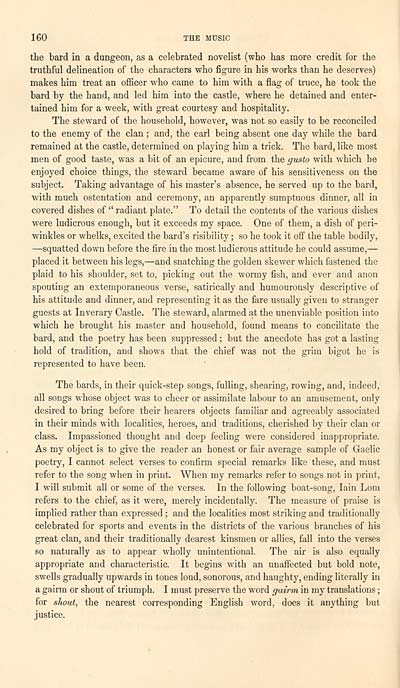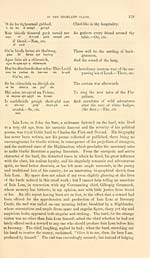Download files
Complete book:
Individual page:
Thumbnail gallery: Grid view | List view

160 THE MDSIC
the bard in a dungeon, as a celebrated novelist (who has more credit for the
truthful delineation of the characters who figure in his works than he deserves)
makes him treat an ofEcer who came to him with a flag of truce, he took the
bard by the hand, and led him into the castle, where he detained and enter-
tained him for a week, with great courtesy and hospitality.
The steward of the household, however, was not so easily to be reconciled
to the enemy of the clan ; and, the earl being absent one day while the bard
remained at the castle, determined on playing him a trick. The bard, like most
men of good taste, was a bit of an epicure, and from the gusto with which he
enjoyed choice things, the steward became aware of his sensitiveness on the
subject. Taking advantage of his master's absence, he served up to the bard,
with much ostentation and ceremony, an apparently sumptuous dinner, all in
covered dishes of " radiant plate." To detail the contents of the various dishes
were ludicrous enough, but it exceeds my space. One of them, a dish of peri-
winkles or whelks, excited the bard's risibility ; so he took it off the table bodily,
— squatted down before the fire in the most ludicrous attitude he could assume, —
placed it between his legs, — and snatching the golden skewer which fastened the
plaid to his shoulder, set to, picking out the wormy fish, and ever and anon
spouting an extemporaneous verse, satirically and humourously descriptive of
his attitude and dinner, and representing it as the fare usually given to stranger
guests at Inverary Castle. The steward, alarmed at the unenviable position into
which he brought his master and household, found means to concilitate the
bard, and the poetry has been suppressed ; but the anecdote has got a lasting
hold of tradition, and shows that the chief was not the grim bigot he is
represented to have been.
The bards, in their quick-step songs, fulling, shearing, rowing, and, indeed,
all songs whose object was to cheer or assimilate labour to an amusement, only
desired to bring before their hearers objects familiar and agreeably associated
in their minds with localities, heroes, and traditions, cherished by their clan or
class. Impassioned thought and deep feeling were considered inappropriate.
As my object is to give the reader an honest or fair average sample of GaeHc
poetry, I cannot select verses to confirm special remarks like these, and must
refer to the song when in print. When my remarks refer to songs not in print,
I will submit all or some of the verses. In the following boat-song, Iain Lom
refers to the chief, as it were, merely incidentally. The measure of praise is
implied rather than expressed ; and the localities most striking and traditionally
celebrated for sports and events in the districts of the various branches of his
great clan, and their traditionally dearest kinsmen or allies, fall into the verses
so naturally as to appear wholly unintentional. The air is also equally
appropriate and characteristic. It begins with an unaffected but bold note,
swells gradually upwards in tones loud, sonorous, and haughty, ending literally in
a gairm or shout of triumph. I must preserve the word gairvi in my translations ;
for slwut, the nearest corresponding English word, does it anything but
justice.
the bard in a dungeon, as a celebrated novelist (who has more credit for the
truthful delineation of the characters who figure in his works than he deserves)
makes him treat an ofEcer who came to him with a flag of truce, he took the
bard by the hand, and led him into the castle, where he detained and enter-
tained him for a week, with great courtesy and hospitality.
The steward of the household, however, was not so easily to be reconciled
to the enemy of the clan ; and, the earl being absent one day while the bard
remained at the castle, determined on playing him a trick. The bard, like most
men of good taste, was a bit of an epicure, and from the gusto with which he
enjoyed choice things, the steward became aware of his sensitiveness on the
subject. Taking advantage of his master's absence, he served up to the bard,
with much ostentation and ceremony, an apparently sumptuous dinner, all in
covered dishes of " radiant plate." To detail the contents of the various dishes
were ludicrous enough, but it exceeds my space. One of them, a dish of peri-
winkles or whelks, excited the bard's risibility ; so he took it off the table bodily,
— squatted down before the fire in the most ludicrous attitude he could assume, —
placed it between his legs, — and snatching the golden skewer which fastened the
plaid to his shoulder, set to, picking out the wormy fish, and ever and anon
spouting an extemporaneous verse, satirically and humourously descriptive of
his attitude and dinner, and representing it as the fare usually given to stranger
guests at Inverary Castle. The steward, alarmed at the unenviable position into
which he brought his master and household, found means to concilitate the
bard, and the poetry has been suppressed ; but the anecdote has got a lasting
hold of tradition, and shows that the chief was not the grim bigot he is
represented to have been.
The bards, in their quick-step songs, fulling, shearing, rowing, and, indeed,
all songs whose object was to cheer or assimilate labour to an amusement, only
desired to bring before their hearers objects familiar and agreeably associated
in their minds with localities, heroes, and traditions, cherished by their clan or
class. Impassioned thought and deep feeling were considered inappropriate.
As my object is to give the reader an honest or fair average sample of GaeHc
poetry, I cannot select verses to confirm special remarks like these, and must
refer to the song when in print. When my remarks refer to songs not in print,
I will submit all or some of the verses. In the following boat-song, Iain Lom
refers to the chief, as it were, merely incidentally. The measure of praise is
implied rather than expressed ; and the localities most striking and traditionally
celebrated for sports and events in the districts of the various branches of his
great clan, and their traditionally dearest kinsmen or allies, fall into the verses
so naturally as to appear wholly unintentional. The air is also equally
appropriate and characteristic. It begins with an unaffected but bold note,
swells gradually upwards in tones loud, sonorous, and haughty, ending literally in
a gairm or shout of triumph. I must preserve the word gairvi in my translations ;
for slwut, the nearest corresponding English word, does it anything but
justice.
Set display mode to: Large image | Transcription
Images and transcriptions on this page, including medium image downloads, may be used under the Creative Commons Attribution 4.0 International Licence unless otherwise stated. ![]()
| Early Gaelic Book Collections > Blair Collection > Treatise on the language, poetry, and music of the Highland clans > (172) |
|---|
| Permanent URL | https://digital.nls.uk/76238295 |
|---|
| Description | A selection of books from a collection of more than 500 titles, mostly on religious and literary topics. Also includes some material dealing with other Celtic languages and societies. Collection created towards the end of the 19th century by Lady Evelyn Stewart Murray. |
|---|
| Description | Selected items from five 'Special and Named Printed Collections'. Includes books in Gaelic and other Celtic languages, works about the Gaels, their languages, literature, culture and history. |
|---|

